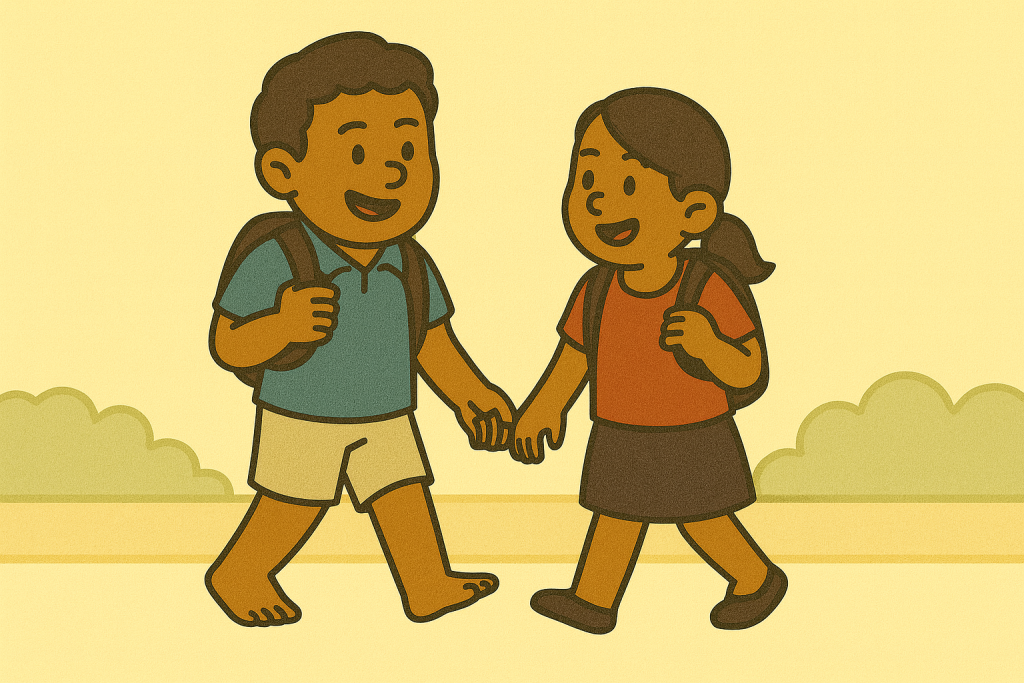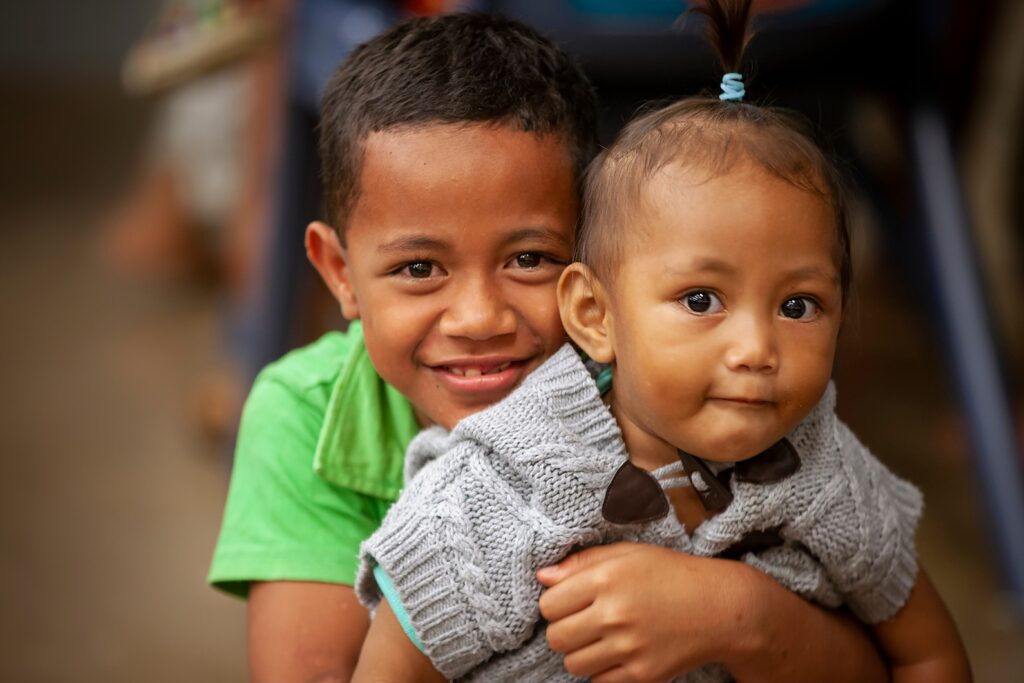Uso: My Brother or My Sister in Samoan

Uso is the Samoan word for brother, but only if you are male. Uso is also the Samoan word for sister, if you are female. So, uso is the Samoan word for any sibling of yours who has the same gender as you do.
For example, if I am a girl, my sister is my uso. If I’m a boy, then my brother is my uso.
A girl referring to her brother would call him her tuagane, whereas a boy referring to his sister calls her the apple of his eye 🙂 … and his tuafafine.
And that’s pretty much it.
But let’s still delve some more into the topic, just because.

My brother or my sister: Which is my uso?
Like talking about your child, the words you use to refer to your brother or sister depends on your own gender.
If you are male
If you identify as male, then your brother is indeed your uso, but you would refer to your sister as tuafafine – not uso.
If you are female
The wording switches up when you’re a girl. If you are female, your sister is your uso, but your brother is referred to as your tuagane – not uso.
Which possessive marker?
When we express that we own or belong to something, the pronoun or adjective we use will fall into the o form or the a form, and will depend on the nature of our relationship to that object/person.
It’s a long story. (And we’ll post a proper lesson about it soon!)
The short story is that with family members, we usually use the o form.
That means that when a female says, ‘my brother‘ in Samoan, she says: ‘o lo’u tuagane.’ (Note the o in lo’u). A male talking about his brother would say: ‘o lo’u uso.’
If I want to refer to my mother’s brother, then I would say: ‘o lona tuagane’. Lona with the o, tuagane because my mother is female. Likewise, to talk about my male cousin’s sister, I would say: ‘o lona tuafafine.’
Pronouncing the Samoan word: uso
When Samoan words begin with a vowel, how we pronounce that first vowel sound is really important. In some cases, it can actually change the meaning of the word.
That first vowel sound will either have a ‘smooth’ kind of pronunciation, or the vowel will begin with a glottal stop sound (like ‘ugh’).
The problem is, in written Samoan, we rarely ever add the glottal stop symbol (the apostrophe or inverted comma) to the beginning of a word, so we just have to know from the context of the sentence which meaning of the word we’re referring to and how it’s supposed to be pronounced.
I know.
This is a language thing that doesn’t happen in English. Whether you say apple or ‘apple doesn’t make a difference to the meaning of apple, but for many Samoan words it does.
For example, the word ai. It will always be written ai, but if you pronounce it without a glottal stop sound, it could mean maybe. With the glottal stop, it could mean to eat.
You get the picture.
Not all Samoan words that begin with a vowel have different meanings, but as Samoan speakers, we should know their traditionally correct pronuncations.
Uso is one of these words. I don’t know of any other meaning attached to the Samoan word uso except what we’ve covered above, but I know now – thanks to corrections from better Samoan speakers than I am – that the right way to pronounce uso is without the glottal stop sound.
So… [oooso], not [‘ooso].
Uso as a slang
Thanks to wrestling and… boys… the Samoan word uso has become super popular these days, even in more mainstream circles – which is amazing.
Any time anything from our little Samoan community catches on in The World is such a buzz for me.
But along with popularity often comes liberties taken.
Out in the diaspora now, uso is often expressed as ‘uce‘ (with the glottal stop sound at the beginning) and used to refer to any gender by any gender.
I don’t know how long that will be a trend – from what I’ve observed, it’s not really a thing yet amongst fluent Samoan speakers – but all languages evolve.
Let’s see what happens.
When your gender is not one or the other
Thank you to everyone who pointed out (in earlier comments on this post) that people don’t always identify as strictly male or female. How would this affect the way you refer to your sisters or brothers? I don’t know that we have a Samoan language ‘rule’ for that situation, but I know lots of fa’afafine (effeminate males) who refer to themselves as female and to their sisters as uso. Until we reach a language consensus, just choose the pronoun that feels correct for you, or check with your non-binary sibling about which pronoun they would prefer.
Bonus Lesson: More than one sibling
In the Samoan language, nouns do not change form to show plurality, so I can have 1 uso or 20 uso. In a sentence, the words around the nouns are modified instead to indicate more than one.
For example:
Notice that the possessive pronoun for ‘my’ changed from lo’u (describing 1) to o’u (describing more than 1)?
And don’t forget… if you’re going count your siblings, because you’re talking about people, you precede the number with to’a.
The Samoan Culture around Brothers & Sisters
Samoan culture is still very patriarchal. While women are a lot more prominent and respected these days, men still dominate in our families and our politics. As part of that system, the role of a man is to lead and provide for his family, and the role of a brother is to honour and protect his sister(s) – at all costs, even life.
I’ve heard my elders often say that for a brother, his sister should be the ‘apple of his eye’, to be placed on a pedestal – right next to his mother – above all other women… yes, even above his wife (but, obviously, in a different way). This is why, as you can imagine, it can be difficult for a guy to date a Samoan girl who has brothers.
On the other hand, a brother who disrespects his sister in any way – for example, verbally abusing her in a heated exchange – can invite some serious retaliation from the rest of the family… including your dead ancestors, even, according to the family curses I’ve heard.
These strong beliefs around gender are probably why the Samoan language is so particular about how we label our brothers and sisters.

Practice Your Samoan Skills
Share your thoughts, ask questions, or practice writing in Samoan!